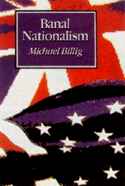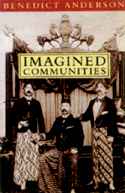When I first started getting interested in nationalism
three years ago, there were very few books that I could find to read. In
the last year or so, they have been pouring out of publishing houses in
a veritable stream.
 If
you want a compilation of the main thinking on the subject, try the
range of extracts in
Nationalism: An Oxford Reader edited by John Hutchinson and Anthony
D Smith (Oxford University Press 1994). It has short pieces by most of
the specialists in the field from Stalin(!) to Benedict Anderson, and it
is usefully divided into categories like �Nationalism and the
International System� and �Beyond Nationalism�.
If
you want a compilation of the main thinking on the subject, try the
range of extracts in
Nationalism: An Oxford Reader edited by John Hutchinson and Anthony
D Smith (Oxford University Press 1994). It has short pieces by most of
the specialists in the field from Stalin(!) to Benedict Anderson, and it
is usefully divided into categories like �Nationalism and the
International System� and �Beyond Nationalism�.
A good read � though I happen to disagree with him � is
Michael
Ignatieff�s personal account of his own encounters with
nationalism in
Blood and Belonging: Journeys into the New Nationalism (Vintage
1994). I really enjoyed the more psychological take of
Banal Nationalism
by Michael
 Billig
(Sage Publications 1995) and much of my more abstract thinking on the
subject was underpinned by Benedict Anderson�s theories in
Imagined Communities (Verso 1983) (though you will get the gist of
his ideas in the Oxford Reader).
Billig
(Sage Publications 1995) and much of my more abstract thinking on the
subject was underpinned by Benedict Anderson�s theories in
Imagined Communities (Verso 1983) (though you will get the gist of
his ideas in the Oxford Reader).
I would recommend anything by Anthony D Smith, who has
both an historical and a global perspective. His most recent book is
Nations and Nationalism in a Global Era (Polity Press 1995. He also
edits the new journal
Nations and Nationalism, the first edition of which was published by
the UK-based London School of Economics in March 1995. Another journal
which often has articles on nationalism (and is worth reading in any
case) is the
New Left Review, which has a range of writers from all around the
world including Branka Magas from former Yugoslavia, the historian
Eric Hobsbawm
(whose general books are also interesting on
nationalism) and Achin Vanik from India.
 If
you are interested in the way in which transnationals and global capital
are undermining the nation-state, you should read
When Corporations Rule the World by David C Korten (Earthscan
Publications Ltd 1995) for a humane and hopeful view and Kenichi Ohmae�s
book
The End of the Nation-State (Harper Collins 1995) for a more
corporate one.
If
you are interested in the way in which transnationals and global capital
are undermining the nation-state, you should read
When Corporations Rule the World by David C Korten (Earthscan
Publications Ltd 1995) for a humane and hopeful view and Kenichi Ohmae�s
book
The End of the Nation-State (Harper Collins 1995) for a more
corporate one.
You may have noticed that so far all the books have been
written by men. It seems that women have only written about nationalism
in so far as it affects women � which is a shame. But
Woman-Nation- State,
edited by Nira Yuval-Davis and Floya Anthias (Macmillan 1989) is well
worth a read for its detailed analysis of women�s situations in
countries ranging from Iran to Uganda to Australia, and Cynthia Enloe is
her usual incisive self with
Bananas, Beaches and Bases: Making Feminist Sense of International
Politics (Pandora 1989).
State,
edited by Nira Yuval-Davis and Floya Anthias (Macmillan 1989) is well
worth a read for its detailed analysis of women�s situations in
countries ranging from Iran to Uganda to Australia, and Cynthia Enloe is
her usual incisive self with
Bananas, Beaches and Bases: Making Feminist Sense of International
Politics (Pandora 1989).
For an historical account, read Kumari Jayawardena�s
Feminism and Nationalism in the Third World (Zed Press 1994), and
Basil Davidson�s
The Black Man�s Burden: Africa and the curse of the Nation-State
(James Curry, 1992). Jorge G Casteneda in
Utopia Unarmed: the Latin American Left after the Cold War (Vintage
1994) addresses the knotty question of the relationship between the Left
and nationalism in Latin America, while George Orwell�s essays,
including
My Country Right or Left show how nationalist feelings can throw
even the most dedicated left-winger into a flat spin (Penguin). And
finally, Thomas Hylland Eriksen provides a different slant with his
Ethnicity and Nationalism: Anthropological Perspectives (Pluto Press
1993).